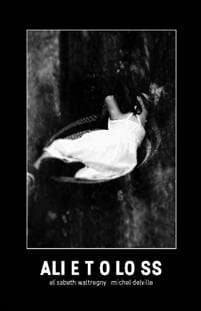
Ali e t o lo ss
257 kr
257 kr
On., 9 juli - ma., 14 juli
Sikker betaling
14 dagers åpent kjøp
Selges og leveres av
AdlibrisProduktbeskrivelse
—Marc Atkins, London, January 5, 2017
Erasurist art is essentially a kind of rewriting. It is rooted as much in contemporary philosophy’s Deconstructionist turn as in Duchampian found objects and Situationist détournements. One of the earliest examples of textual erasurism in contemporary poetry is Ronald Johnson’s 1977 "RADI OS", a partial obliteration of the first four books of John Milton’s "Paradise Lost" preserving only a few words from each page of the source-text. "Ali e t o lo ss" subjects Lewis Carroll’s "Ali(c)e T(hr) o(ugh the) Lo(oking Gla)ss" to a similar treatment, revealing the lyrical backbone of the source-text, isolating some of its vital semantic «organs» while simultaneously responding to the deep and complex forms of Elisabeth Waltregny’s photographs, which were themselves inspired by Lewis Carroll’s specular worlds. Each poem is composed of words taken from one of the twelve chapters of Alice in the order in which they appear, the line breaks indicating the «gaps» in the source-text.
— Michel Delville
Artikkel nr.
e3a79fc5-3af8-4d37-9128-309a8dc3228e
Ali e t o lo ss
257 kr
257 kr
On., 9 juli - ma., 14 juli
Sikker betaling
14 dagers åpent kjøp
Selges og leveres av
AdlibrisLignende toppselgere

POP MART Labubu The Monsters Exciting Macaron Vinyl Face Blind Box
699 kr

POP MART Labubu The Monsters Big Into Energy Series Figures Vinyl Plush Pendant Blind Box
699 kr

Øreputer for Bose QuietComfort - QC35/QC25/QC15/AE2 Hodetelefoner Svart
99 kr

Lattafa Angham EDP parfymert vann unisex, 100 ml
925 kr
Tidligere laveste pris:
998 kr

INF TYPE-C Dual SD/TF-kortleser for rask dataoverføring 0
89 kr
Tidligere laveste pris:
99 kr

NÖRDIC Lightning Kortläsare SD UHS-I
240 kr

Malibu Fast Tanning Bronzing Butter with Beta Carotene 300ml
179 kr

Max Smekker
99 kr
Tidligere laveste pris:
164 kr

Sony | Playstation® 5 Slim (Digital-versjon) - Spillekonsoll - 1TB SSD NVme - Wi-Fi/LAN - Hvid
5 837 kr

Afnan Supremacy Collector's Edition Eau De Parfum 100 ml (man)
781 kr
Anbefalinger til dig

3-Pak - Fidget Spinners med Sugekopp for Barn
179 kr

Hundetrimmer / Potetrimmer - Trimmer for Poter
199 kr

INF Støydempende og lydisolerende ørepropper med krok
114 kr
Tidligere laveste pris:
143 kr

Luftrenseenhet - Renser / Saniterer luften - 20,000 mg/h
699 kr

INF Spiralreflekterende fugleskremsel 10-pakning Sølv 30 cm
119 kr
Tidligere laveste pris:
143 kr

INF Etterfilter til Dyson V11 / V15 akselstøvsuger 3-pakning
229 kr

INF Sovemaske 100 % silke Sort
99 kr
Tidligere laveste pris:
124 kr

Rasasi Parfyme for menn Rasasi Hawas Ice EDP, 100 ml
580 kr

Reparasjonsmarkør for Møbler - 12-Pak
139 kr

Sovestøtte Bilbarnesete - Hodestøtte for barn Bilar
89 kr